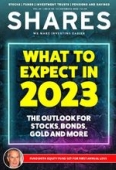Archived article
Please note that tax, investment, pension and ISA rules can change and the information and any views contained in this article may now be inaccurate.
Bad year for investors Terry Smith and Nick Train but Warren Buffett is a winner

Fundsmith Equity (B4Q5X52), Terry Smith’s flagship fund with over £22 billion of assets, is looking at its first annual loss since it was launched in November 2010.
For the 11 months to the end of November 2022, the total return for the T Class Accumulation shares was -15.1% compared with a 2.8% loss for global equities (as measured by the MSCI World index in sterling), a 12.9% loss for long-dated UK government bonds and a positive return of 1.1% on cash.
The year started badly with an uncharacteristic loss of 9.5% in January, the fund’s biggest ever monthly drawdown, followed by a 4.1% loss in February.
From here it was hard to recoup ground due to choppy markets following the invasion of Ukraine and rising interest rates, which prompted more investor selling of quality growth companies and a widespread rotation towards lower quality value sectors.
In his half-year shareholder letter, Smith explained the effect of rising interest rates on the portfolio. He said: ‘The share prices of more highly rated equities, which are in effect discounting profits or cash flows further into the future by being rated on higher price to earnings ratios, tend to be more affected by rising interest rates than lowly rated so-called value stocks. Our portfolio is not exempt from this effect.’
During the first half, the fund’s best performers were defensive stocks such as Brown-Forman (BF.B:NYSE), Novo Nordisk (NOVO-B:CPH), PepsiCo (PEP:NASDAQ) and Philip Morris (PM:NYSE).
By November, the fund was on more of an even keel although for the month it still lagged global equities and UK gilts due to negative contributions from stocks such as Amazon (AMZN:NASDAQ), Intuit (INTU:NASDAQ) and Visa (V:NYSE).
Smith is undeterred, however, and is maintaining his bias towards quality companies in the consumer, healthcare and technology sectors with Microsoft (MSFT:NASDAQ), Novo Nordisk, L’Oreal (OR:EPA), Philip Morris, IDEXX (IDXX:NASDAQ) and LVMH (MC:EPA) making up his top six holdings.
HOW HAS NICK TRAIN PERFORMED IN 2022?
Even though Nick Train is one of the UK’s best-known fund managers, he is facing his second year in a row of underperforming the benchmark for his Finsbury Growth & Income Trust (FGT). In the year to 7 December, his trust was down 7.5% versus a 4% decline in the FTSE All-Share index.
‘It’s irrational to think about investment in discrete 12-month chunks,’ he told Shares’ editor Daniel Coatsworth in late November, ‘but my net asset value for Finsbury is a couple of percent behind the benchmark year-to-date. That wouldn’t fuss me too much except for the fact that last year I was also a few percent behind. I’ve got two back-to-back years, potentially, where we may fail to meet our minimum aspiration which is to do better than the FTSE All-Share index. Maybe I do feel a bit disappointed.’
Train was at pains to point out the underlying performance of most companies in his portfolio was still good. ‘During the course of the year, the investment trust increased its dividend by 6% over last year. In the context of unquestionably difficult times in markets and economies, I was reassured that the underlying earnings and dividend-paying power of this portfolio remained pretty resilient in what isn’t anyone’s favourite calendar year.’
For Finsbury’s financial year ending 30 September 2022, the trust saw a -5.8% net asset value per share total return versus -4% from the FTSE All-Share.
In Citywire’s ranking of equity fund managers investing in UK companies, Train came in 50th place for performance across his mutual funds Lindsell Train UK Equity (B18B9X7) and Lindsell Train Global Equity (B644PG0) for the 12 months to 31 October 2022. While the UK fund has underperformed this calendar year, the global one has beaten its MSCI World benchmark with a 3.1% decline versus a 7.3% loss from the comparative index.
Train’s investment style is hinged on being patient and his followers would be wise to do the same. On a longer-term basis, his funds have outperformed, and a few bad years are not going to see the manager try something different in pursuit of better returns.
Some of the biggest holdings in Finsbury’s portfolio have enjoyed a good 2022 including a 14.4% rise in Burberry’s (BRBY) share price and London Stock Exchange (LSE) up 11.4% year-to-date. Unilever (ULVR) and Mondelez (MDLZ:NASDAQ) have also seen share price gains though there have also been some headwinds from share price weakness in the likes of Schroders (SDR) and Experian (EXPN).
Train used the broader market sell-off in 2022 to buy more of what he already owns including more shares in Experian and Fevertree (FEVR:AIM) rather than initiate new positions.
Quite a few stocks in Finsbury’s portfolio are currently in demand – businesses that are defensive in nature and whose products are being bought by consumers and businesses no matter if the economy is good or bad. However, Train is at pains to stress that Finsbury is not a pureplay defensive investment. He believes the portfolio will not only help to protect investors’ capital in difficult times, but also generate ‘competitive absolute returns over all longer time periods.’
HOW HAS WARREN BUFFETT PERFORMED?
With exposure to economically sensitive parts of the US economy such as energy and financials, it isn’t a surprise that Warren Buffett’s Berkshire Hathaway (BRK.B:NYSE) investment vehicle has outperformed this year with the shares up 2.3% compared with a 17% loss for the S&P 500 index.
Over the 65 years under Buffett’s tenure Berkshire has outperformed the S&P 500 (including dividends) two thirds of the time. An impressive feat.
Figures until the end of 2021 show total returns for Berkshire annualised at 20.1% a year, double the 10.5% return delivered by the S&P 500. Compounded over 65 years that means the lucky investors in at the start have done 120 times better than the index.
HOW HAVE THE STOCK HOLDINGS PERFORMED IN 2022?
Investors won’t know how well Berkshire’s wholly owned businesses have performed in 2022 until the full year results are released next year. But the conglomerate also owns a stock portfolio worth around $300 billion.
Berkshire holds close to 50 companies but the top five account for over two thirds of the value of the portfolio. Apple (APPL:NASDAQ) is by far the largest holding accounting for close to 40% of the total.
Despite a torrid time for technology stocks, Apple shares have held up relatively well, falling by 20%. That may seem a large decline, but it’s nothing compared to the 48% decline in Amazon (AMZN:NASDAQ) and the 56% slump in Tesla (TSLA:NASDAQ) this year.
Part of the attraction for Buffett is Apple’s relentless repurchasing of its own shares which has totaled $554 billion over the last decade.
Bank of America (BAC:NYSE) is the second largest holding for Berkshire Hathaway at around a tenth of the portfolio. Aggressive interest rate tightening by the US Federal Reserve has provided a good tailwind for banks this year. Theoretically they make a bigger spread on loans when rates rise.
However, analysts see Bank of America’s earnings dropping around 10% in 2022. The shares have lost 30% year-to-date.
ENERGY BOOST
One bright spot in the portfolio is integrated oil company Chevron (CVX:NYSE) whose shares have surged 50% on higher energy prices. The holding accounts for 8% of the portfolio.
Oil and gas company Occidental Petroleum (OXY:NYSE) has done even better with the shares more than doubling in value this year. It accounts for 4% of Berkshire’s stock portfolio.
The latest purchase to make the top 10 holdings is Taiwanese semiconductor maker TSMC (TSM:NASDAQ).
Disclaimer: The author (Ian Conway) owns shares in Finsbury Growth & Income. The auther and editor (Daniel Coatsworth) own units in Fundsmith Equity
Important information:
These articles are provided by Shares magazine which is published by AJ Bell Media, a part of AJ Bell. Shares is not written by AJ Bell.
Shares is provided for your general information and use and is not a personal recommendation to invest. It is not intended to be relied upon by you in making or not making any investment decisions. The investments referred to in these articles will not be suitable for all investors. If in doubt please seek appropriate independent financial advice.
Investors acting on the information in these articles do so at their own risk and AJ Bell Media and its staff do not accept liability for losses suffered by investors as a result of their investment decisions.
Issue contents
Feature
- We reveal the best performing UK stocks in 2022: large and small
- The outlook for stocks, bonds, gold and more: what to expect in 2023
- Why investors can’t afford to overlook Europe’s growth and income champions
- Discover what fund managers got right and wrong in 2022
- Bad year for investors Terry Smith and Nick Train but Warren Buffett is a winner
Great Ideas
News
- Regulators put Microsoft and Meta under scrutiny as big tech growth slows
- Chemring’s cybersecurity hidden jewel is starting to shine
- How freezing temperatures saw power prices rocket to record levels
- Why consumer squeeze and higher rental rates have clobbered Airbnb shares
- Balfour Beatty shares hit 11-year high on booming infrastructure market
- Could the Royal Mail final dividend be decided in Westminster?
- House prices cooling quickly after two years of red-hot growth

 magazine
magazine








